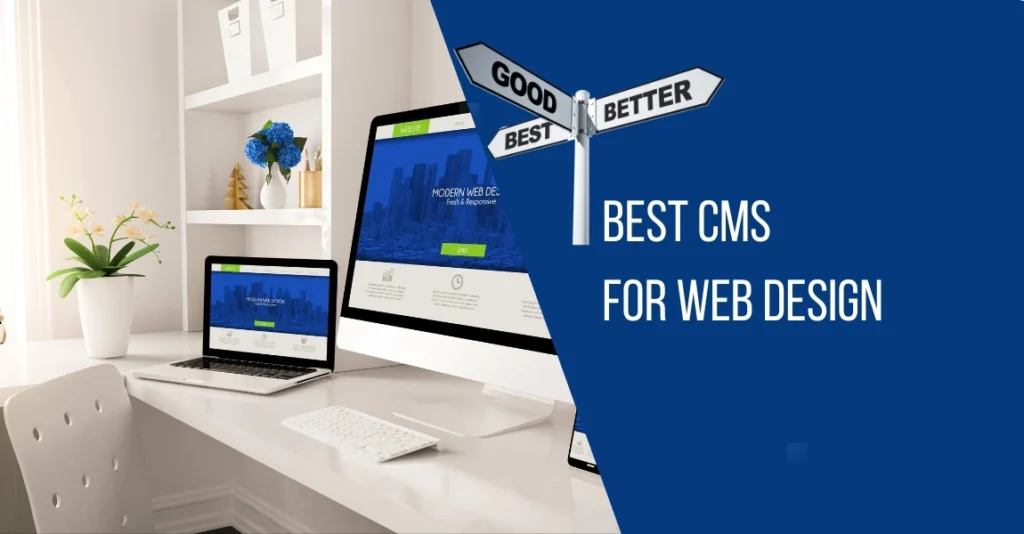A good content management system (CMS) is important for businesses, bloggers, and organizations. It helps them create a strong online presence. Whether you are managing a business website, an eCommerce store, or a personal blog, a CMS makes it easy to create, update, and manage digital content.
With the right CMS, you can improve website performance, enhance security, and boost search engine rankings. In this article, we’ll explore ten compelling reasons why you need a good CMS for web design and content management.
1. Easy Website Management
A CMS allows you to manage your website without needing advanced technical skills. Traditional websites require coding knowledge to update content, but a CMS offers a user-friendly interface where you can easily make changes.
Most modern CMS platforms come with drag-and-drop functionality, making it simple to add images, update text, and create new pages. This ease of use ensures that even non-technical users can keep their websites up-to-date.
2. No Coding Knowledge Required
In the past, web development required knowledge of HTML, CSS, and JavaScript. Today, a good CMS eliminates the need for coding skills by providing ready-made templates and design tools.
Platforms like WordPress, Wix, and Shopify allow users to build and customize their websites using themes and plugins. This makes web design accessible to everyone, from small business owners to large enterprises.
3. Quick and Easy Content Updates
With a CMS, updating content is simple and fast. Whether you need to add a blog post, edit product descriptions, or update company information, a CMS allows you to do so in just a few clicks.
Instead of relying on developers for small changes, you can manage your content independently. This ensures your website remains fresh and relevant, which is essential for SEO and user engagement.
4. A Good Content Management System Leads to Better SEO Optimization
Search engine optimization (SEO) is crucial for driving traffic to your website. A good CMS includes built-in SEO tools that help you optimize your content for search engines.
With a CMS, you can:
- Customize meta titles and descriptions
- Optimize URLs
- Add alt text to images
- Improve website speed and performance
Popular CMS platforms like WordPress offer SEO plugins such as Yoast SEO and Rank Math, making it easy to optimize your site and rank higher in search engine results.
5. Mobile-Friendly Design
A responsive website is essential in today’s mobile-driven world. A good CMS ensures your site looks great on all devices, whether desktops, tablets, or smartphones.
Most modern CMS platforms offer mobile-friendly themes and automatic responsiveness, so your website adjusts to different screen sizes. This enhances user experience and improves your Google rankings, as search engines prioritize mobile-friendly websites.
6. A Good Content Management System Should Offer Strong Security Features
Website security is a major concern for businesses and individuals. A CMS provides regular security updates, firewalls, and backup options to protect your website from hackers and malware.
Some CMS platforms, like Drupal and Joomla, offer advanced security features for high-risk websites, while others like WordPress and Shopify provide security plugins to enhance protection. Regular updates help keep your site safe from cyber threats.
7. Multi-User Collaboration
A CMS allows multiple users to collaborate on website content without interfering with each other’s work. This is especially useful for businesses, online magazines, and large organizations.
With role-based permissions, you can:
- Assign editors to manage content
- Allow writers to create blog posts
- Give developers access to site settings
This feature streamlines content management and workflow, making it easier to run a professional website.
8. Scalable for Business Growth
As your business grows, your website needs to expand. A good CMS is highly scalable, allowing you to add new pages, features, and functionalities without rebuilding your site from scratch.
For example:
- eCommerce businesses can add more products and payment options
- Blogs can scale up with more content categories
- Corporate websites can integrate advanced features like AI chatbots and membership areas
A CMS grows with your business, ensuring that your website remains efficient and future-proof.
9. Integration with Third-Party Tools
A CMS allows seamless integration with marketing, analytics, and automation tools. You can connect your site to:
- Google Analytics for tracking visitor behavior
- Email marketing tools like Mailchimp
- Social media platforms for content sharing
- Payment gateways for online transactions
These integrations help you manage your business effectively and improve user experience.
10. Cost-Effective and Time-Saving
A CMS saves time and money by simplifying website management. Instead of hiring a developer for every small change, you can update your website yourself.
Many CMS platforms offer affordable pricing with free and premium options. For example, WordPress is free, while premium CMS solutions like Shopify and Wix offer paid plans with additional features.
With a CMS, you can reduce website maintenance costs while maintaining full control over your content and design.
Conclusion
A good CMS is essential for anyone looking to build a website efficiently. Whether you need a simple blog, an eCommerce store, or a business website, a CMS makes it easy to manage and scale your site.
A Good Content Management System CMS provides all the tools needed for a successful online presence. From SEO optimization and security to multi-user collaboration and mobile responsiveness. you can create a website that is secure, scalable, and user-friendly.
FAQ (Frequently Asked Questions)
1. What is a CMS?
A content management system (CMS) is a platform that allows users to create, edit, and manage website content without coding skills.
2. Which is the best CMS for beginners?
WordPress, Wix, and Shopify are great CMS options for beginners due to their user-friendly interfaces.
3. Can I use a CMS for an eCommerce store?
Yes. Shopify, WooCommerce (on WordPress), and Magento are popular CMS platforms for online stores.
4. Is a good CMS good for SEO?
Yes. A good CMS includes SEO tools that help optimize content, improve site speed, and enhance search engine rankings.
5. Do I need coding skills to use a CMS?
No. Most CMS platforms provide drag-and-drop functionality, themes, and plugins, eliminating the need for coding.
6. How secure are CMS platforms?
Security depends on the CMS you choose. Platforms like Drupal offer high security, while WordPress requires security plugins and regular updates.
7. Can I migrate my website to another CMS?
Yes, but website migration can be complex and may require professional help to avoid data loss.
10. Can a CMS handle high-traffic websites?
Yes. CMS platforms like Drupal and Joomla are designed to handle large, high-traffic websites efficiently.



